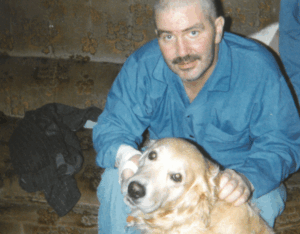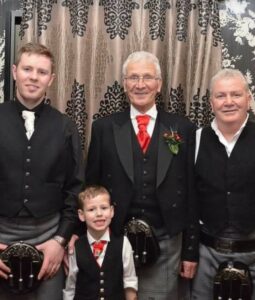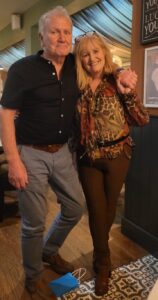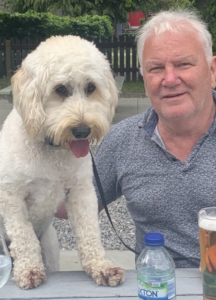
12 Jun 2025
Three stem cell transplants give Bill 24-year recovery…and counting
“They said they would try the drug and a third boost of stem cells. If it doesn’t work, they said there’s nothing more we can do. He was very ill by that time. He sat in bed and said to me ‘I’m dying’. I said, ’not on my shift’. I sat with him all night and at 7am he opened his eyes and said ‘I’m still here.’”
The majority of leukaemia patients who need a stem cell transplant go through just one, sometimes two. Bill McGugan went through three of the life-saving procedures, and the emotional roller-coaster took a huge toll on him. Here, Bill’s wife Alison tells the story of Bill’s incredible recovery and the place of peace he’s now reached.
“Initially Bill was just a bit tired,” said Alison, who lives with Bill in Scotland. “Then he went to his GP for a routine medical examination – his employers asked for one for insurances purposes.”
Part of the medical involved a blood test. Two days after the examination, Bill’s GP turned up at his house to deliver the life-changing news.
“He told Bill he thought he had blood cancer and asked us to come with him straight away to the hospital. Bill rang me at work and I came straight home. They were waiting for us at the hospital but, unbelievably, the bed had McGugin not McGugan on it. We had a desperate hope that it wasn’t us, and there had been a mistake. But it was Bill they were expecting, and they told him they thought he might have leukaemia.”
Bill was given more tests and in August 1997, he was diagnosed with chronic myeloid leukaemia (CML). He was just 42 at the time.
“We had to wait overnight for the results. I can honestly say it was the longest night of my life. Early the next morning, the consultant came to see us and explained what Bill had and how serious it was. We were absolutely devastated. They said that unless they started treatment now, he would be dead in six months to a year. We just couldn’t comprehend what was happening as Bill had no real symptoms. We felt very isolated to begin with and really scared.”
Treatment began immediately with blood transfusions and interferon injections. After a few weeks, Bill was told he would need a bone marrow transplant to make a full recovery.

Bill during treatment
“Bill’s brother was tested but wasn’t a match, so he was added to the Anthony Nolan list for a donor. After six months of searching unsuccessfully, our doctor suggested as a last resort we test Bill’s parents. They said the best chance of a match was a sibling and it would be highly unlikely with any other family member, but we were desperate. We were stunned to find out Bill’s dad John was a match.”
In March 1998, Bill received five days of radiotherapy, before he was placed in a sterile bubble and given his dad’s bone marrow.
“It was a very emotional day. He remained there for five months, with me and a nurse looking after him by putting my hands through sterile sleeves that went into his room. As they had killed all his own marrow before the transplant, he was too vulnerable to be allowed out. It was an awful waiting game, just waiting for the new marrow to work.”
But Bill struggled to recover fully and had to have a second transplant from his dad four months later. This time, Bill developed Graft vs Host Disease – a sign that the transplant was working.
However, once again, Bill’s CML fought back.
Bill was placed on a clinical trial for a new drug called Gleevec, the brand name for imatinib. Imatinib is an oral targeted therapy medication, now commonly used to treat CML and ALL.
Before Imatinib became the standard treatment for CML, a 100% match (HLA-matched) stem cell transplant was one of the few curative options. Multiple transplants were uncommon as it meant a greater risk of complications. However, in rare cases, like Bill’s, three transplants may have been necessary. The introduction of effective targeted therapies like Imatinib has since revolutionised CML treatment, making transplants far less common.*

Bill with his dad, son and grandson (four generations)
Doctors told Alison and Bill that the trial was being carried out at Hammersmith Hospital in London, but they could bring Gleevec to him at the hospital in Glasgow, where Bill was receiving treatment.
“They said they would try the drug and a third boost of stem cells. If it doesn’t work, they said there’s nothing more we can do. He was very ill by that time. He sat in bed and said to me ‘I’m dying’. I said, ’not on my shift’. I sat with him all night and at 7am he opened his eyes and said ‘I’m still here.’”
Bill’s third and final transplant, combined with the trial drug, was the miracle that he and Alison had hoped for. Bill returned home and started on the road to recovery.
Eventually, after two years off work, Bill returned to his job. He has struggled to deal with the long-term emotional impact of the trauma, however, with the love and support of Alison, doctors and family, he has now been cancer-free for 24 years.

Bill with his wife Alison
Bill remains a part of the drug trial, with regular bloods sent to Hammersmith Hospital. He also has ongoing treatment for possible side effects of his leukaemia and treatment.

Bill with his cockerpoo, Bailey.
Now retired, Bill enjoys spending time with Alison and their wonderful support group of family, friends and their cockerpoo, Bailey.
“We’ve been married for over 40 years and he’s an absolute inspiration for all of us. We live each day grateful for every minute and extremely thankful for all the medical attention and wonderful treatment received from all the amazing people we met along the way.”
* Jain N, van Besien K. Chronic myelogenous leukemia: role of stem cell transplant in the imatinib era. Hematol Oncol Clin North Am. 2011 Oct;25(5):1025-48, vi. doi: 10.1016/j.hoc.2011.09.003. PMID: 22054733; PMCID: PMC3246008.
Share your story
We want to help people tell and share the leukaemia stories that matter – stories like Bill and stories like yours.
Related posts
15 February 2024
Parents join Leukaemia UK in calling for more donations to fund research to stop blood cancer ‘destroying childhoods’
Parents of children whose lives have been devastated by leukaemia have joined Leukaemia UK on International Childhood Cancer Day (February 15th) in calling for more research into the blood cancer. …
24 September 2021
Leading leukaemia charities call on Rishi Sunak not to cut financial lifeline for blood cancer patients
Leukaemia Care, Leukaemia UK and Leukaemia and Lymphoma Northern Ireland, have written to the Chancellor urging him to realise the devastating impact the end of the Coronavirus Job Retention Scheme will have on the clinically extremely vulnerable (CEV).
9 May 2018
Sharing this exciting news: a treatment advance for childhood leukaemia
A deal has been struck to let the NHS offer children an expensive new cancer therapy that has been called the most exciting treatment advance for decades
27 August 2020
Leukaemia UK appoints new CEO
The trustees of Leukaemia UK are delighted to announce that they have appointed Fiona Hazell as CEO of Leukaemia UK. Fiona brings a strong track record in not-for-profit leadership, starting her role on 9th September 2020.